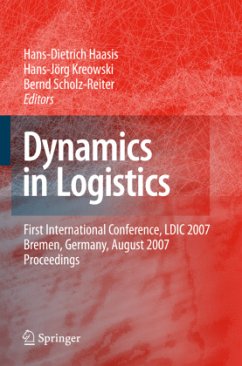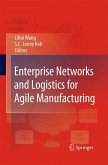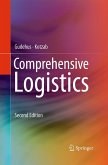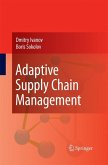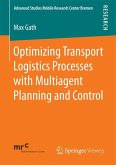Dynamics in Logistics
First International Conference, LDIC 2007, Bremen, Germany, August 2007. Proceedings
Herausgegeben:Haasis, Hans-Dietrich; Kreowski, Hans-Jörg; Scholz-Reiter, Bernd
Dynamics in Logistics
First International Conference, LDIC 2007, Bremen, Germany, August 2007. Proceedings
Herausgegeben:Haasis, Hans-Dietrich; Kreowski, Hans-Jörg; Scholz-Reiter, Bernd
- Gebundenes Buch
- Merkliste
- Auf die Merkliste
- Bewerten Bewerten
- Teilen
- Produkt teilen
- Produkterinnerung
- Produkterinnerung
Logistic problems can rarely be solved satisfyingly within one single scientific discipline. This cross-sectional character is taken into account by the Research Cluster for Dynamics in Logistics with a combination of economical, information and production technical and enterprise-oriented research approaches. In doing so, the interdisciplinary cooperation between university, research institutes and enterprises for the solution of logistic problems is encouraged.
This book comprises the edited proceedings of the first International Conference on Dynamics in Logistics LDIC 2007. The scope of…mehr
Andere Kunden interessierten sich auch für
![Trends in Supply Chain Design and Management Trends in Supply Chain Design and Management]() Hosang Jung / F. Frank Chen / Bongju Jeong (eds.)Trends in Supply Chain Design and Management116,99 €
Hosang Jung / F. Frank Chen / Bongju Jeong (eds.)Trends in Supply Chain Design and Management116,99 €![Enterprise Networks and Logistics for Agile Manufacturing Enterprise Networks and Logistics for Agile Manufacturing]() Enterprise Networks and Logistics for Agile Manufacturing116,99 €
Enterprise Networks and Logistics for Agile Manufacturing116,99 €![Comprehensive Logistics Comprehensive Logistics]() Timm GudehusComprehensive Logistics128,99 €
Timm GudehusComprehensive Logistics128,99 €![Adaptive Supply Chain Management Adaptive Supply Chain Management]() Dmitry IvanovAdaptive Supply Chain Management116,99 €
Dmitry IvanovAdaptive Supply Chain Management116,99 €![Proceedings of the 36th International MATADOR Conference Proceedings of the 36th International MATADOR Conference]() Proceedings of the 36th International MATADOR Conference232,99 €
Proceedings of the 36th International MATADOR Conference232,99 €![Optimizing Transport Logistics Processes with Multiagent Planning and Control Optimizing Transport Logistics Processes with Multiagent Planning and Control]() Max GathOptimizing Transport Logistics Processes with Multiagent Planning and Control39,99 €
Max GathOptimizing Transport Logistics Processes with Multiagent Planning and Control39,99 €![Bioethics in a Small World Bioethics in a Small World]() Bioethics in a Small World39,99 €
Bioethics in a Small World39,99 €-
-
-
Logistic problems can rarely be solved satisfyingly within one single scientific discipline. This cross-sectional character is taken into account by the Research Cluster for Dynamics in Logistics with a combination of economical, information and production technical and enterprise-oriented research approaches. In doing so, the interdisciplinary cooperation between university, research institutes and enterprises for the solution of logistic problems is encouraged.
This book comprises the edited proceedings of the first International Conference on Dynamics in Logistics LDIC 2007. The scope of the conference was concerned with the identification, analysis, and description of the dynamics of logistic processes and networks. The spectrum reached from the planning and modelling of processes over innovative methods like autonomous control and knowledge management to the new technologies provided by radio frequency identification, mobile communication, and networking.
Two invited papers and of 42 contributed papers on various subjects give an state-of-art overview on dynamics in logistics. They include routing in dynamic logistic networks, RFID in logistics and manufacturing networks, supply chain control policies, sustainable collaboration, knowledge management and service models in logistics, container logistics, autonomous control in logistics, and logistic process modelling.
This book comprises the edited proceedings of the first International Conference on Dynamics in Logistics LDIC 2007. The scope of the conference was concerned with the identification, analysis, and description of the dynamics of logistic processes and networks. The spectrum reached from the planning and modelling of processes over innovative methods like autonomous control and knowledge management to the new technologies provided by radio frequency identification, mobile communication, and networking.
Two invited papers and of 42 contributed papers on various subjects give an state-of-art overview on dynamics in logistics. They include routing in dynamic logistic networks, RFID in logistics and manufacturing networks, supply chain control policies, sustainable collaboration, knowledge management and service models in logistics, container logistics, autonomous control in logistics, and logistic process modelling.
Produktdetails
- Produktdetails
- Verlag: Springer / Springer Berlin Heidelberg / Springer, Berlin
- Artikelnr. des Verlages: 978-3-540-76861-6
- Seitenzahl: 466
- Englisch
- Abmessung: 241mm x 155mm x 31mm
- Gewicht: 857g
- ISBN-13: 9783540768616
- ISBN-10: 3540768610
- Artikelnr.: 23476076
- Herstellerkennzeichnung Die Herstellerinformationen sind derzeit nicht verfügbar.
- Verlag: Springer / Springer Berlin Heidelberg / Springer, Berlin
- Artikelnr. des Verlages: 978-3-540-76861-6
- Seitenzahl: 466
- Englisch
- Abmessung: 241mm x 155mm x 31mm
- Gewicht: 857g
- ISBN-13: 9783540768616
- ISBN-10: 3540768610
- Artikelnr.: 23476076
- Herstellerkennzeichnung Die Herstellerinformationen sind derzeit nicht verfügbar.
Hans-Dietrich Haasis is full professor for Business Administration, Production Management and Industrial Economics at the University of Bremen and chairman of Business Administration, Production-Management and Industrial Economics, University of Bremen, and director of the ISL - Institute of Shipping Economics and Logistics, Bremen. He held lectures at the Ecole Nationale Superieure de Petrole et des Moteurs, Paris Rueil-Malmaison, at the University Eichstätt-Ingolstadt, and at the Private University Witten-Herdecke. He also was invited to give lectures at the St. Petersburg State University of Economics and Finance, and the Technical University of Changcha, China.
Hans-Jörg Kreowski is professor for Theoretical Computer Science at the University of Bremen. His main research topics are graph transformation, formal modelling and their applications in computer science and logistics. He (co)-authored and (co)-edited 15 books and published more than 120 scientific papers.
Bernd Scholz-Reiter was founder and head of the Fraunhofer Application Center for Logistics Systems Planning and Information Systems at Cottbus. Since November 2000 he is a full professor and chair holder of the chair of Planning and Control of Production Systems (PSPS) at the University of Bremen where he also serves as director of the Bremen Institute of Industrial Technology and Applied Work Science (BIBA). He was initiator and vice-speaker of the research group on Autonomous Control of Logistic Processes, speaker of the Bremen Research Cluster for Dynamics in Logistics as well as speaker of the International Graduate School for Dynamics in Logistics. Scholz-Reiter is an ordinary member of the Berlin-Brandenburg Academy of Sciences and Humanities, an ordinary member of acatech, the Council for Engineering Sciences at the Union of the German Academies of Sciences and Humanities; BESIDE OTHER NATIONAL MEMBERSHIIPS he is a member of CIRP, the International Institution for Production Engineering Research, a fellow of the European Academy of Industrial Management (AIM) and an Advisory Board member of the Schlesinger Laboratory at TECHNION - Israel Institute of Technology, Haifa, Israel, as well as a member of the Scientific Advisory Board of the German Logistics Association (BVL). Professor Scholz-Reiter serves as vice president of the German Research Foundation (Deutsche Forschungsgemeinschaft, DFG). He is editor of the professional journals Industrie-Management and PPS-Management and member of the editorial board of the scientific International Journal Production Planning & Control. He is author and co-author of more than 250 scientific publications..
Hans-Jörg Kreowski is professor for Theoretical Computer Science at the University of Bremen. His main research topics are graph transformation, formal modelling and their applications in computer science and logistics. He (co)-authored and (co)-edited 15 books and published more than 120 scientific papers.
Bernd Scholz-Reiter was founder and head of the Fraunhofer Application Center for Logistics Systems Planning and Information Systems at Cottbus. Since November 2000 he is a full professor and chair holder of the chair of Planning and Control of Production Systems (PSPS) at the University of Bremen where he also serves as director of the Bremen Institute of Industrial Technology and Applied Work Science (BIBA). He was initiator and vice-speaker of the research group on Autonomous Control of Logistic Processes, speaker of the Bremen Research Cluster for Dynamics in Logistics as well as speaker of the International Graduate School for Dynamics in Logistics. Scholz-Reiter is an ordinary member of the Berlin-Brandenburg Academy of Sciences and Humanities, an ordinary member of acatech, the Council for Engineering Sciences at the Union of the German Academies of Sciences and Humanities; BESIDE OTHER NATIONAL MEMBERSHIIPS he is a member of CIRP, the International Institution for Production Engineering Research, a fellow of the European Academy of Industrial Management (AIM) and an Advisory Board member of the Schlesinger Laboratory at TECHNION - Israel Institute of Technology, Haifa, Israel, as well as a member of the Scientific Advisory Board of the German Logistics Association (BVL). Professor Scholz-Reiter serves as vice president of the German Research Foundation (Deutsche Forschungsgemeinschaft, DFG). He is editor of the professional journals Industrie-Management and PPS-Management and member of the editorial board of the scientific International Journal Production Planning & Control. He is author and co-author of more than 250 scientific publications..
Invited Papers.- Challenges in Design of Heterarchical Controls for Dynamic Logistic Systems.- Making the Business Case for RFID.- General Aspects of Dynamics in Logistics.- Review of Trends in Production and Logistic Networks and Supply Chain Evaluation.- Dynamic Data Mining for Improved Forecasting in Logistics and Supply Chain Management.- Introducing Bounded Rationality into Self-Organization-Based Semiconductor Manufacturing.- Routing in Dynamic Logistics Networks.- Travel Time Estimation and Deadlock-free Routing of an AGV System.- Integration of Routing and Resource Allocation in Dynamic Logistic Networks.- Dynamic Vehicle Routing with Drivers' Working Hours.- RFID in Logistics and Manufacturing Networks.- A Survey of RFID Awareness and Use in the UK Logistics Industry.- RFID-Based Intelligent Logistics for Distributed Production Networks.- Methodology for Development and Objective Comparison of Architectures for Networked RFID.- Supply Chain Control Policies.- Determining Optimal Control Policies for Supply Networks Under Uncertainty.- Adaptive Production and Inventory Control in Supply Chains against Changing Demand Uncertainty.- A Framework of Adaptive Control for Complex Production and Logistics Networks.- Mechanisms of Instability in Small-Scale Manufacturing Networks.- Decentralized Decision-making in Supply Chains.- Aspects of Agent Based Planning in the Demand Driven Railcab Scenario.- Merging Time of Random Mobile Agents.- Dynamic Decision Making on Embedded Platforms in Transport Logistics - A Case Study.- The Global RF Lab Alliance: Research and Applications.- The Value of RF Based Information.- Reengineering and Simulation of an RFID Manufacturing System.- LIT Middleware: Design and Implementation of RFID Middleware Based on the EPC NetworkArchitecture.- Shelf Life Prediction by Intelligent RFID - Technical Limits of Model Accuracy.- Sustainable Collaboration.- Effects of Autonomous Cooperation on the Robustness of International Supply Networks - Contributions and Limitations for the Management of External Dynamics in Complex Systems.- Sustainability and Effectiveness in Global Supply Chains: Toward an Approach Based on a Long-term Learning Process.- Risk Management in Dynamic Logistic Systems by Agent Based Autonomous Objects.- Knowledge Management and Service Models in Logistics.- Knowledge Management in Intermodal Logistics Networks.- Knowledge Management in Food Supply Chains.- Service Models for a Small-sized Logistics Service Provider - A Case Study from Finland.- Container Logistics.- A Framework for Integrating Planning Activities in Container Terminals.- Electronic Seals for Efficient Container Logistics.- Towards Autonomous Logistics: Conceptual, Spatial and Temporal Criteria for Container Cooperation.- Distributed Process Control by Smart Containers.- Autonomous Control in Logistics.- Autonomous Units for Communication-based Dynamic Scheduling.- Autonomously Controlled Adaptation of Formal Decision Models - Comparison of Generic Approaches.- Clustering in Autonomous Cooperating Logistic Processes.- Application of Small Gain Type Theorems in Logistics of Autonomous Processes.- Next Generation Supply Chain Concepts.- Web-service Based Integration of Multi-organizational Logistic Process.- An Approach for the Integration of Data Within Complex Logistics Systems.- Developing a Measurement Instrument for Supply Chain Event Management-Adoption.- Developing a Security Event Management System for Intermodal Transport.- Logistic Processes Modelling.- Autonomous Control of a Shop Floor Based onBee's Foraging Behaviour.- Proof Principles of CSP - CSP-Prover in Practice.- Application of Markov Drift Processes to Logistical Systems Modeling.- Analysis of Decentral Order-picking Control Concepts.
Invited Papers.- Challenges in Design of Heterarchical Controls for Dynamic Logistic Systems.- Making the Business Case for RFID.- General Aspects of Dynamics in Logistics.- Review of Trends in Production and Logistic Networks and Supply Chain Evaluation.- Dynamic Data Mining for Improved Forecasting in Logistics and Supply Chain Management.- Introducing Bounded Rationality into Self-Organization-Based Semiconductor Manufacturing.- Routing in Dynamic Logistics Networks.- Travel Time Estimation and Deadlock-free Routing of an AGV System.- Integration of Routing and Resource Allocation in Dynamic Logistic Networks.- Dynamic Vehicle Routing with Drivers' Working Hours.- RFID in Logistics and Manufacturing Networks.- A Survey of RFID Awareness and Use in the UK Logistics Industry.- RFID-Based Intelligent Logistics for Distributed Production Networks.- Methodology for Development and Objective Comparison of Architectures for Networked RFID.- Supply Chain Control Policies.- Determining Optimal Control Policies for Supply Networks Under Uncertainty.- Adaptive Production and Inventory Control in Supply Chains against Changing Demand Uncertainty.- A Framework of Adaptive Control for Complex Production and Logistics Networks.- Mechanisms of Instability in Small-Scale Manufacturing Networks.- Decentralized Decision-making in Supply Chains.- Aspects of Agent Based Planning in the Demand Driven Railcab Scenario.- Merging Time of Random Mobile Agents.- Dynamic Decision Making on Embedded Platforms in Transport Logistics - A Case Study.- The Global RF Lab Alliance: Research and Applications.- The Value of RF Based Information.- Reengineering and Simulation of an RFID Manufacturing System.- LIT Middleware: Design and Implementation of RFID Middleware Based on the EPC NetworkArchitecture.- Shelf Life Prediction by Intelligent RFID - Technical Limits of Model Accuracy.- Sustainable Collaboration.- Effects of Autonomous Cooperation on the Robustness of International Supply Networks - Contributions and Limitations for the Management of External Dynamics in Complex Systems.- Sustainability and Effectiveness in Global Supply Chains: Toward an Approach Based on a Long-term Learning Process.- Risk Management in Dynamic Logistic Systems by Agent Based Autonomous Objects.- Knowledge Management and Service Models in Logistics.- Knowledge Management in Intermodal Logistics Networks.- Knowledge Management in Food Supply Chains.- Service Models for a Small-sized Logistics Service Provider - A Case Study from Finland.- Container Logistics.- A Framework for Integrating Planning Activities in Container Terminals.- Electronic Seals for Efficient Container Logistics.- Towards Autonomous Logistics: Conceptual, Spatial and Temporal Criteria for Container Cooperation.- Distributed Process Control by Smart Containers.- Autonomous Control in Logistics.- Autonomous Units for Communication-based Dynamic Scheduling.- Autonomously Controlled Adaptation of Formal Decision Models - Comparison of Generic Approaches.- Clustering in Autonomous Cooperating Logistic Processes.- Application of Small Gain Type Theorems in Logistics of Autonomous Processes.- Next Generation Supply Chain Concepts.- Web-service Based Integration of Multi-organizational Logistic Process.- An Approach for the Integration of Data Within Complex Logistics Systems.- Developing a Measurement Instrument for Supply Chain Event Management-Adoption.- Developing a Security Event Management System for Intermodal Transport.- Logistic Processes Modelling.- Autonomous Control of a Shop Floor Based onBee's Foraging Behaviour.- Proof Principles of CSP - CSP-Prover in Practice.- Application of Markov Drift Processes to Logistical Systems Modeling.- Analysis of Decentral Order-picking Control Concepts.

